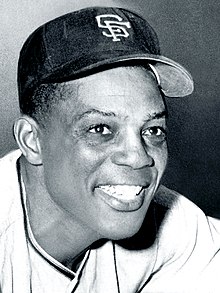It took me awhile............................."Gotcha candy bars!" common sayings at ballparks................u do look a little different in person.............my eyesight is bad..........................All Century team...
Willie Mays
| Willie Mays | |||
|---|---|---|---|

Mays in 1961
| |||
| Center fielder | |||
| Born: May 6, 1931 Westfield, Alabama | |||
| |||
| MLB debut | |||
| May 25, 1951, for the New York Giants | |||
| Last MLB appearance | |||
| September 9, 1973, for the New York Mets | |||
| MLB statistics | |||
| Batting average | .302 | ||
| Hits | 3,283 | ||
| Home runs | 660 | ||
| Runs batted in | 1,903 | ||
| Stolen bases | 338 | ||
| Teams | |||
| Negro leagues
Major League Baseball
| |||
| Career highlights and awards | |||
| |||
| Member of the National | |||
| Induction | 1979 | ||
| Vote | 94.7% (first ballot) | ||
Willie Howard Mays, Jr. (born May 6, 1931), nicknamed "The Say Hey Kid", is an American former Major League Baseball (MLB) center fielder who spent almost all of his 22-season career playing for the New York/San Francisco Giants, before finishing with the New York Mets. He is regarded as one of the greatest baseball players of all time and was elected to the Baseball Hall of Fame in 1979.
Mays won two National League (NL) Most Valuable Player (MVP) awards, he ended his career with 660 home runs—third at the time of his retirement and currently fifth all-time—and won a record-tying 12 Gold Glove awards beginning in 1957, when the award was introduced.[1]
Mays shares the record of most All-Star Games played with 24, with Hank Aaron and Stan Musial.[2][3] In appreciation of his All-Star record, Ted Williams said "They invented the All-Star Game for Willie Mays."[4][5]
Mays' career statistics and his longevity in the pre-performance-enhancing drugs era have drawn speculation that he may be the finest five-tool player ever, and many surveys and expert analyses, which have examined Mays' relative performance, have led to a growing opinion that Mays was possibly the greatest all-around offensive baseball player of all time.[6] In 1999, Mays placed second on The Sporting News's "List of the 100 Greatest Baseball Players", making him the highest-ranking living player. Later that year, he was also elected to the Major League Baseball All-Century Team. Mays is one of five National League players to have had eight consecutive 100-RBI seasons, along with Mel Ott, Sammy Sosa, Chipper Jones, and Albert Pujols. Mays hit over 50 home runs in 1955 and 1965, representing the longest time span between 50-plus home run seasons for any player in Major League Baseball history. His final Major League Baseball appearance came on October 16 during Game 3 of the 1973 World Series.
Contents
Early life[edit]
Mays was born in 1931 in Westfield, Alabama, a former primarily black settlement near Fairfield.[7] His father, Cat Mays, was a talented baseball player with the Negro team for the local iron plant.[8] His mother, Annie Satterwhite, was a gifted basketball and track star in high school.[9] His parents never married.[9] As a baby, Mays was cared for by his mother's younger sisters Sarah and Ernestine. Sarah became the primary female role model in Mays' life. At age 3 Mays' parents separated. Though his mother later married, his father took in a set of older orphan girls to help with raising young Willie. Mays always saw these two as his aunts.[10][11] His father exposed him to baseball at an early age, and by the age of five he was playing catch with his father.[12] At age 10, Mays was allowed to sit on the bench of his father's League games.[13]
Mays played multiple sports at Fairfield Industrial High School, averaging a then-record 17 points a game in basketball and more than 40 yards a punt in football, while also playing quarterback.[14] Mays graduated from Fairfield in 1950.[15]
Professional baseball[edit]
Negro leagues[edit]
Mays' professional baseball career began in 1947, while he was still in high school; he played briefly with the Chattanooga Choo-Choos in Tennessee during the summer. A short time later, Mays left the Choo-Choos and returned to his home state to join the Birmingham Black Barons of the Negro American League. Mays helped them win the pennant and advance to the 1948 Negro League World Series, where they lost the series 4-1 to the Homestead Grays. Mays hit a respectable .262 for the season, but it was also his excellent fielding and baserunning that made him a standout. By playing professionally with the Black Barons, Mays jeopardized his opportunities to play high school sports in Alabama. This created some problems for him with high school administrators at Fairfield, who wanted him to help the teams and ticket sales.[16]
Over the next several years, a number of major league baseball franchises sent scouts to watch him play. The first was the Boston Braves. The scout who discovered him, Bud Maughn, had been following him for over a year and referred him to the Braves, who then packaged a deal that called for $7,500 down and $7,500 in 30 days. They also planned to give Mays $6,000. The obstacle in the deal was that Tom Hayes, owner of the Birmingham Black Barons, wanted to keep Mays for the balance of the season. Had the team been able to act more quickly, the Braves franchise might have had both Mays and Hank Aaron in their outfield from 1954 to 1973. The Brooklyn Dodgers also scouted him and wanted Ray Blades to negotiate a deal, but were too late. The New York Giants had already signed Mays for $4,000 and assigned him to their Class-B affiliate in Trenton, New Jersey.[17]
No comments:
Post a Comment